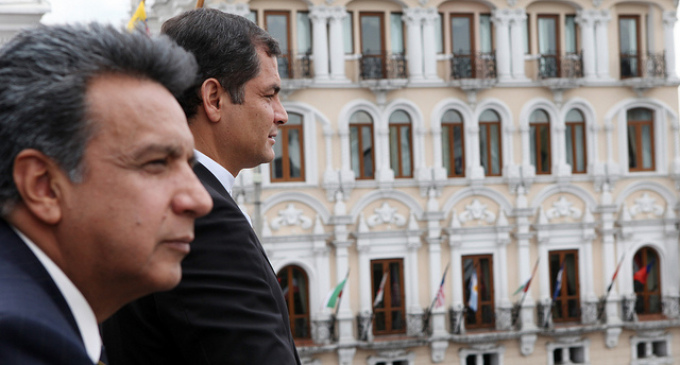What to expect from Ecuador’s new president


IT WAS hardly a ringing endorsement. With nearly all the votes counted, Lenín Moreno, the political heir of Ecuador’s left-wing president, Rafael Correa, won the presidential election by barely more than two percentage points. That victory brings to an end a series of defeats for left-wing governments in Latin America. Mr Moreno will try to continue Mr Correa’s free-spending populism, but he will have less money and will exercise less power than his predecessor did during more than a decade in office.
Mr Moreno’s narrow victory on April 2nd came after an ugly fight with Guillermo Lasso, a conservative former banker. Mr Moreno’s party, Alianza PAIS, unjustly attacked his rival as one of the authors of Ecuador’s financial crisis in 1999-2000. (Mr Lasso was briefly finance and economy minister at the time, but quit because he opposed Ecuador’s decision to default on its bonds.) Mr Lasso’s connection to Opus Dei, a conservative Catholic organisation, probably counted against him.
One respected exit poll gave the edge to Mr Lasso, who has so far refused to concede. His supporters have been holding large demonstrations to demand a recount. But Mr Moreno’s victory seems likely to stand. Luis Almagro, secretary-general of the Organisation of American States, which had sent election monitors to Ecuador, acknowledged him as president-elect.
Mr Moreno probably won in part because voters preferred his promises of expanded welfare to Mr Lasso’s offer to cut taxes and red tape. Mr Moreno, who was Mr Correa’s vice-president from 2007 to 2013, said he would continue his “21st-century socialism”, under which social-welfare spending doubled as a share of GDP between 2006 and 2012. Mr Moreno says he will treble a cash transfer to poor households, raise pensions, provide 100,000 subsidised houses a year and build 40 technical universities. Julian Assange, the founder of WikiLeaks, will remain a guest at Ecuador’s embassy in London for the foreseeable future. (Mr Lasso would have made him face rape charges in Sweden.)
Hosting Mr Assange is easy, if perhaps trying; keeping the rest of Mr Moreno’s promises will be hard. A drop in oil prices since 2014 has pushed the economy IGNORE INTO recession. Mr Correa compensated for lower government revenue by borrowing more. The cost of servicing Ecuador’s debt last year was 12.1% of GDP, up from 7.2% in 2007, the year Mr Correa took office. The country uses the dollar as its currency, which has hurt its competitiveness. Although Alianza PAIS, Mr Moreno’s party, has kept its majority in congress, its margin is smaller.
Despite his alarming first name and his pledge to continue Mr Correa’s policies, Mr Moreno has a reputation as a pragmatist. Born in Nuevo Rocafuerte, a hamlet in the Amazon forest accessible only from the Napo river, he grew up in Quito, the capital, where he began his career in the tourist industry. He has been in a wheelchair since 1998, when muggers shot him. But his personality is sunny. He set up a foundation to promote “humour and happiness” and has published a book called “The World’s Best Jokes”.
As Mr Correa’s vice-president, he portrayed himself as more tolerant and less power-hungry than his boss. He expressed misgivings about Mr Correa’s assaults on press freedom. After the United States Justice Department disclosed that Ecuadorean officials had taken at least $33.5m in bribes from Odebrecht, a Brazilian company, between 2007 and 2016, Mr Moreno promised to carry out “major surgery” to stop corruption with the help of the UN. That implicitly challenges Mr Correa in two ways: the president curbed the independence of the judiciary and denied that corruption was a serious problem.
Mr Moreno’s promise to be a more liberal, corruption-fighting version of Mr Correa faces obstacles. One is his running mate, Jorge Glas, the current vice-president. He has been the target of numerous allegations of corruption, which he denies. He and his allies in congress are likely to resist a crackdown on graft. Another worry is about Mr Moreno’s health; he has refused to release his medical records. To carry on the popular bits of correísmo while discarding the bad ones, the new president will need plenty of energy.





